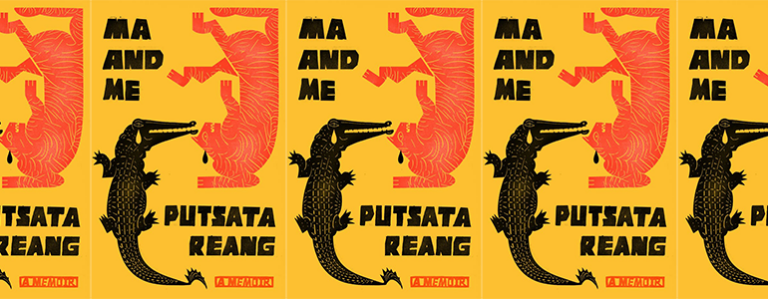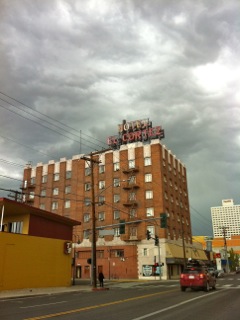Ask This, Not That
I once heard a story about John Cleese, of Monty Python fame, contributing a lunch date to a silent auction. And my first thought was, “This is one of the most generous things that man could possibly do.” Not because it took tremendous time or energy, but because how many times a day does someone approach John Cleese on the street and launch into the cheese shop routine? Or maybe it’s the argument one, or maybe they want to return a dead parrot. The point is, people must come up and say the same things, again and again and again. About work he finished thirty years ago. That this man would willingly subject himself to an hour of fan talk over a plate of cold salmon is, I think, reason enough to knight the guy.
Writers, in our own small way, are subject to such repetition, even if we’re desperately grateful for the attention in a way John Cleese is probably quite over. Listen: Any writer who sincerely complains about readers’ earnest queries is one I will personally slap. And yet… Can I say it? Answering the same questions again and again can be Chinese water torture.
The thing is, it’s not just bookstore events, but every interview, every classroom visit, every dinner party conversation where people want to know what it’s like to write a book. And I’m guilty of it myself. I go to a friend’s reading, and she’s published an amazing novel, one I could write five graduate papers on. And all that comes out of my mouth is, “How long did it take you to write the book?”
And so, partly for my own future reference, and partly to spice up your next live author event, I’ve taken my cue from the diet books. (You know, the ones that say “Don’t drink that venti mocha. Instead, chew this piece of kale!”) I’ve asked some writer friends for their pet peeves, relied heavily on my own, and herewith present: ASK THIS, NOT THAT.
Don’t ask:
Is that character based on someone you know?
Why not:
It’s an insult to an author’s powers of invention. You wouldn’t ask a musician if her song was based on some other song she’d heard.
Instead ask:
Can you talk about the development of the professor character?
Don’t ask:
How autobiographical is this work?
Why not:
It’s a little insulting (see above), a little embarrassing, and honestly, it’s none of your business. (I mean, what do you want? “Well, the abortion is based on my own experience, but not the investment banking part…”)
Instead ask:
What is one of the least autobiographical elements? What was the biggest stretch for you?
Don’t ask:
What was the editing process like?
Why not:
It’s a little like Jay Leno asking Scarlett Johansen what it was like to work with Woody Allen. “Oh, it was just magical.” An actress can’t say anything against her director, and a writer can’t say anything against her editor, so you’re not likely to get the real scoop.
Instead ask:
What was in the drafts that didn’t make it into the final version?
Don’t ask:
How did you get the idea for this story?
Why not:
It’s what we all want to know, which means it’s the one question the writer has answered at least 70 times so far.
Instead ask:
What was the first part you wrote? What is the oldest thing that actually made it into the final version?
Don’t ask:
How long did it take to write this?
Why not:
It doesn’t tell you much anyway. It could’ve taken me five months and been excruciatingly hard work, or it could’ve taken me twelve years because I poked away at it.
Instead ask:
What was the hardest part to write?
Never, ever ask:
How come your book sucks?
Seriously? People ask that?
It happens. Usually not in so many words.
Instead ask (yourself):
Why am I here at this reading of a book I didn’t enjoy when I could be eating a burrito or getting laid or watching a movie? What the hell is wrong with me?
Don’t ask:
Where do you get your ideas?
Why not:
Honestly, writers usually have too many ideas. We hear a weird noise in the night, and we instantly have seventeen ideas of what it could be, all equally deadly. This is what makes us writers. And to a writer, this question is nonsensical. I’ve never heard it get a coherent answer.
Instead ask:
That scene that starts on page 49? The one with the howler monkey? I was wondering how you got the idea to set it in the Italian restaurant, and if you have any personal experience with pasta making.
Don’t ask:
How can you be a mother and still find time to write?
Why not:
Would you ask a man how on earth he finds time to father?
Instead:
Do ask a man. See how startled he looks? Let’s change the world by only asking men this question from now on.
Don’t ask:
What is your writing routine? Do you compose on the computer?
Why not:
I know hundreds of writers, and I know exactly one – one! – who writes with a pen. Would you ask a banker about her banking routine? Our answers are about as interesting. We sit at the computer and write. Sometimes, we play computer solitaire.
Instead ask:
Any of the following: “Where else can I find your work?” “What alternate image would you have chosen for the cover?” “Which character was your favorite to write?” “How did you manage all that research into the world of rabbit farming?” “Can I get you a drink?”
And I do hasten to add, lest I sound like a cranky ingrate: If you come t0 my reading and ask any of the verboten questions above, I won’t mind a bit. I’ll be too busy hugging you for showing up.


